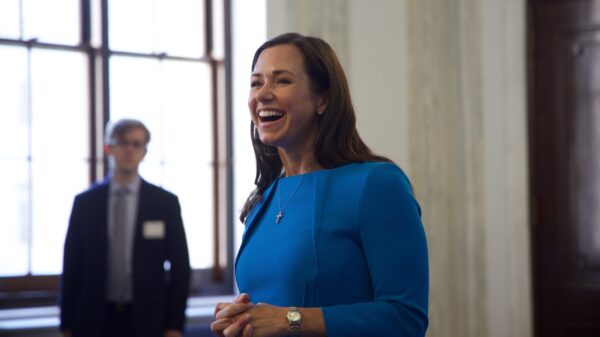By Brandon Moseley
Alabama Political Reporter
Another Obama-era regulation was scrapped when the Federal Communications Commission voted to repeal its landmark net neutrality rules on Thursday. Republicans have been campaigning along to deregulate the broadband industry and voted 3 to 2 along party lines to repeal the 2015 net neutrality rules. Congressman Bradley Byrne, R-Montrose, announced this support for the decision to reduce broadband regulation.
“Another important point on why I believe it was important to roll back the FCC’s heavy-handed ‘net neutrality’ regulations: the regulations have hurt competition,” Byrne said on social media. “Who benefits from confusing and burdensome regulations? Big companies who can hire lawyers and specialists to comply with them. That hurts start-ups and small companies who want to provide broadband services, especially in rural communities. Since these regulations passed in 2015, broadband investment has fallen for two years in a row. This is why we need less government regulation and intervention.”
The FCC voted to repeal its 2015 Open Internet Order. Democratic legislators and progressive activists protested the decision outside.
FCC Chairman Ajit Pai said in a four page statement: “Let’s be absolutely clear. Following today’s vote, Americans will still be able to access the websites they want to visit. They will still be able to enjoy the services they want to enjoy. There will still be cops on the beat guarding a free and open Internet. This is the way things were prior to 2015, and this is the way they will be once again.”
“Our decision today will also return regulatory parity to the Internet economy,” Pai said. “Some giant Silicon Valley platforms favor imposing heavy-handed regulations on other parts of the Internet ecosystem. But all too often, they don’t practice what they preach. Edge providers regularly block content that they don’t like. They regularly decide what news, search results, and products you see—and perhaps more importantly, what you don’t. And many thrive on the business model of charging to place content in front of eyeballs. What else is “Accelerated Mobile Pages” or promoted tweets but prioritization? What is worse, there is no transparency into how decisions that appear inconsistent with an open Internet are made. How does a company decide to restrict a Senate candidate’s campaign announcement video because her views on a public policy issue are too “inflammatory”? How does a company decide to demonetize videos from political advocates without notice? How does a company expressly block access to websites on rival devices or prevent dissidents’ content from appearing on its platform? How does a company decide to block from its app store a cigar aficionado app, apparently because the company perceives that the app promotes tobacco use? You don’t have any insight into any of these decisions, and neither do I. Yet these are very real, actual threats to an open Internet—coming from the very entities that claim to support it.”
“Many words have been spoken during this debate but the time has come for action,” Pai said. “It is time for the Internet once again to be driven by engineers and entrepreneurs and consumers, rather than lawyers and accountants and bureaucrats. It is time for us to act to bring faster, better, and cheaper Internet access to all Americans. It is time for us to return to the bipartisan regulatory framework under which the Internet flourished prior to 2015. It is time for us to restore Internet freedom.”
“Despite its unassuming name, the Obama administration’s net neutrality regulation threatens the free and open internet that has done so much to advance modern society,” Speaker of House Paul Ryan, R-Wis., said. “The Trump administration’s action to roll back this egregious government overreach into the most innovative space will benefit all users of the internet. As Chairman Pai outlined today, the way to protect consumers is to put the Federal Trade Commission back on the beat to crack down on those who would abuse open access. This new plan of action will open new avenues for telemedicine, distance learning, and future innovations.”
“As a result of today’s misguided action, our broadband providers will get extraordinary new power from this agency,” Jessica Rosenworcel, a Democrat on the commission who voted against the repeal said. “They will have the power to block websites, throttle services and censor online content. They will have the right to discriminate and favor the internet traffic of those companies with whom they have pay-for-play arrangements and the right to consign all others to a slow and bumpy road.”
“Today’s vote represents a departure from more than a decade of broad, bipartisan consensus on the rules governing the internet,” Michael Beckerman, CEO of the Internet Association trade group, which represents tech giants like Facebook, Google and Amazon, said. “Relying on [internet service providers] to live up to their own ‘promises’ is not net neutrality and is bad for consumers.”
“There is a ton of false and misleading information out there about today’s action by the Federal Communications Commission (FCC) regarding “net neutrality,” Byrne said. “Here’s the simple truth: today’s action ends heavy-handed regulation of the Internet that was first started in 2015 by the FCC under President Obama. Simply put: this reverts back to the rules prior to 2015. Last time I checked, the Internet worked fine back in 2015, and I expect it to do the same moving forward. Internet service providers didn’t block websites before the Obama Administration’s regulations, and they won’t now that they are repealed. This is all about rolling back government regulations and allowing the free market to work.”
(Original reporting by the Hill’s Harper Neidig contributed to this report.)






















































